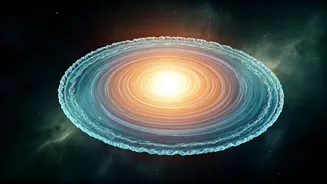An Unexpected Revelation
The realm of space exploration has recently been treated to an incredible discovery that has left scientists in awe. Researchers have identified a planet-forming
disk, or protoplanetary disk, that is brimming with water. What sets this finding apart is the disk's age, which is far more ancient than the star it is associated with. This unexpected revelation completely changes our understanding of how planetary systems arise and how essential components for life, like water, are distributed throughout the cosmos. The implications of this are significant. It challenges prevailing models and opens up new avenues for research into the creation and evolution of planets, potentially revealing if the building blocks for life are more common than previously believed. The team's careful analysis and innovative techniques have allowed this groundbreaking discovery, prompting a reevaluation of established theories.
Water's Cosmic Origins
The presence of water in this ancient protoplanetary disk is extremely significant. Water is known to be a vital component for life as we know it, making this finding crucial in the broader search for habitable planets. Scientists have long debated the origin of water on Earth. Some theories suggest that our planet's water arrived via icy asteroids or comets. The presence of water in a disk that is even older than the star itself presents a new perspective. It indicates that water, in the form of ice or vapor, could have been a fundamental element from the beginning. This could mean that water, and thus the potential for life, may be prevalent throughout the universe, present from the very early stages of planetary system formation. This discovery reinforces the concept that the conditions necessary for life are possibly present far beyond our own solar system. This could lead to a re-evaluation of current space exploration goals.
Disk's Formation Insights
Understanding the process by which a protoplanetary disk forms and evolves is central to understanding how planets emerge. The new research offers insights into this fundamental process. The disk, which is composed of dust and gas, is the material left over from the formation of a star. Over time, particles within the disk collide and stick together, eventually forming planetesimals, the building blocks of planets. The presence of water in this disk provides an opportunity to study how water is integrated into the planet-formation process. Analyzing the composition and distribution of water within the disk can allow scientists to learn how water is incorporated into forming planets. Studying the disk's properties can also help us determine how these evolving planetary systems may, or may not, support life. This novel finding gives an incredible glimpse into the dynamics of planetary formation.
Advanced Observational Techniques
This remarkable discovery wouldn't have been possible without the use of advanced observational techniques. Scientists utilized powerful telescopes and specialized instruments to study the distant disk. These tools allowed them to analyze the light emitted or absorbed by the disk, allowing them to determine its composition, temperature, and structure. The ability to detect and analyze the faint signals from these distant disks requires cutting-edge technology and sophisticated data processing. This new discovery is a testament to the advancements in observational astronomy. These tools have given us an unprecedented ability to probe the cosmic phenomena. This could pave the way for future studies of exoplanets and protoplanetary disks, revealing more details about how planets and life come into existence.
Future Research Pathways
The discovery of an ancient, water-rich protoplanetary disk has opened up exciting new avenues for research. Astronomers are now eager to delve deeper into this phenomenon. Future research will likely focus on analyzing the water molecules' detailed composition within the disk, seeking information about their origins and distribution. Scientists may attempt to trace the disk's water to specific regions or chemical compounds. This could also involve studying other protoplanetary disks to determine the prevalence of water in these environments. The goal is to develop a more comprehensive understanding of the role of water in planet formation and its implications for the potential habitability of exoplanets. As technology develops, we can expect even more surprises as we explore the universe.





















